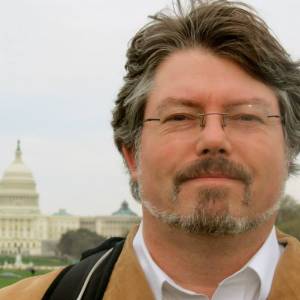We are poorer for losing Rich
Richard Jarrell was my professor, friend, and mentor. I first met him in 2005 as a mature student undergraduate in the Science & Society Program (my minor at the time). We got along well and I was able to take a course with him, Big Science, when I became a graduate student in the Science & Technology Studies Program at York University.
Big, tall, burly, and with a deep voice that resonated warmly from behind his beard and a mid-West American accent that hinted at his Indiana roots, Rich and I would often chat about Big Science, Tesla, Edison, Fessenden, the Manhattan Project, the Cold War, and my research into Robert J. Van de Graaff, High Voltage Engineering Corporation, and the history of physics - mostly in his office at 310 Bethune College - with the backdrop of his forest of plants looming behind him. It was the history of physics in which I took a double-term directed reading course under Rich. He mentored me on physics history, early particle accelerator history, early physicists, physics funding, MIT history, and so on to prep me for my Master's research into Van de Graaff. Rich took interest in the topic and was looking forward to reading my final paper for my degree. Alas, that will never happen now. He was felled by a heart attack this past Saturday. His wife Martha and son D'Arcy were at his side when he passed.
Rich was a respected member of York University's academic community. He was with the University since the early 1970s and helped develop the STS program here. Rich was a generous mentor and a fine scholar - particularly of Canadian and radio astronomy history. He also enjoyed digging into local history and, with colleagues, blew apart the myth of the founding father of Ontario's wine industry.
Pictured are two books he loaned me recently (among many over the years) and one from the library he had me learn inside and out twice. In the background is Rich's faculty profile (text transcribed further down this page).
His absence leaves a hole in our hearts and in our Faculty. I will miss our chats.
I raise my glass to you, my friend. Rest in peace.
From Rich's profile page at YorkU:
Richard Jarrell
Interim Program Coordinator
Professor of Natural Science;
Graduate Program in History
AB, Indiana; MA, PhD, Toronto
Richard Jarrell has long worked on comparative history of science (Britain, Ireland, Canada and Australia), focusing upon scientific and technical education and the role of the state in science. Founding editor of the journal Scientia Canadensis and co-founder of the Canadian Science and Technology Historical Association, he has co-edited six books on Canadian science, technology and medicine. As an historian of astronomy, he published The Cold Light of Dawn: A History of Canadian Astronomy (University of Toronto, 1988), numerous articles, has completed a six-year stint on the editorial team of the Biographical Encyclopedia of Astronomers (Springer, 2007) and is now working on a study of Canadian radio astronomy.
On the history of the Ontario wine industry (letter to the editor):
Don’t celebrate bogus wine industry history
"I read with interest Monique Beech’s article on Johann Schiller and the early wine industry of Ontario, wrote Richard Jarrell, a professor of natural science in York’s Faculty of Science & Engineering, in a letter to the St. Catharines Standard Dec. 4 [2010].
My own research, which will be published soon in the journal Ontario History, makes it clear that the Ontario wine industry was founded by J.M. de Courtenay in the early 1860s in Cooksville. My research, like that of my colleagues Alun Hughes at Brock University and Rod Phillips at Carleton University, has unearthed no evidence that Johann Schiller even grew grapes and made wine. He certainly did not found the Ontario wine industry. His story is an urban legend and I am quite chagrined to see a movement to create a phony anniversary.
We have much to celebrate with the renaissance of the wine industry in our province; let us not sully it by creating a bogus history."
Lastly, Richard Jarrell's message to current and future "renaissance" engineers:
"Jarrell said he was worried about the text and e-mail heavy world of non-present communications, which he called socially bleak.
'We need to be citizens first. Citizens have adaptability and are present in the world. They are taught to move about and seek a broader education,' he said. 'Flexibility, adaptability and broad-based education are important. There is a need to be nimble and move into a variety of careers because the broader the education, the more useful the engineer, and the better the citizen, the better the communicator and the more visionary the human being.'"
~ Full article at YFile (04 May 2012).
- 0
- 0
- Canon PowerShot SX40 HS
- 1/33
- f/2.7
- 4mm
- 100

Comments
Sign in or get an account to comment.


